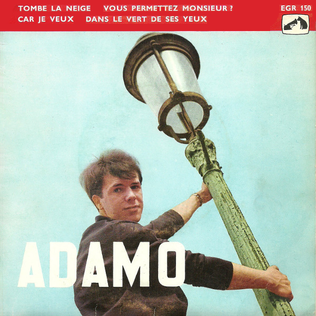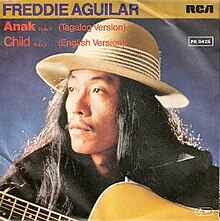
Samuel Hui Koon-kit, usually known as Sam Hui, is a Hong Kong musician, singer, songwriter and actor. He is credited with popularising Cantopop both via the infusion of Western-style music and his usage of vernacular Cantonese rather than written vernacular Chinese in biting lyrics that addressed contemporary problems and concerns. Hui is considered by some to be the first major superstar of Cantopop, known as the God of Song. As an actor, he is well-known for portraying the main character "King Kong" in five installments of the Aces Go Places film series.
Tsui is a surname. It is an alternative transcription of two Chinese surnames, namely Cuī (崔) and Xú (徐).

"Music Box Dancer" is an instrumental piece by Canadian musician Frank Mills that was an international hit in the late 1970s. It features an arpeggiated piano theme in C-sharp major designed to resemble a music box, accompanied by other instruments playing a counterpoint melody as well as a wordless chorus. Most modern piano music sheets have the song in the key of C major.

Ferdinand Pascual Aguilar, better known as Freddie Aguilar, Ka Freddie Aguilar, or simply Ka Freddie, is a Filipino folk musician and singer-songwriter regarded as one of the pillars and icons of Original Pilipino Music (OPM). He is best known for his rendition of "Bayan Ko", which became the anthem of the opposition against the regime of Ferdinand Marcos during the 1986 People Power Revolution, and for his song "Anak", the best-selling Philippine music record of all time, selling 33 million copies worldwide. He is heavily associated with Pinoy rock.
Pinoy rock, or Filipino rock, is the brand of rock music produced in the Philippines or by Filipinos. It has become as diverse as the rock music genre itself, and bands adopting this style are now further classified under more specific genres or combinations of genres like alternative rock, post-grunge, ethnic, new wave, pop rock, punk rock, funk, reggae, heavy metal, ska, and recently, indie. Because these genres are generally considered to fall under the broad rock music category, Pinoy rock may be more specifically defined as rock music with Filipino cultural sensibilities.

Paula Tsui Siu Fung is a Hong Kong singer, with a career spanning over 50 years. She was affiliated with the TVB television station until the mid-1990s and has performed for Asia Television on several occasions since 1995. Over fourteen of her albums have been certified platinum by the IFPI Hong Kong.

Ace York Caesar Asturias Aguilar, better known by his stage name Ace Vergel, was a Filipino actor dubbed "The Original Bad Boy of Philippine Movies". He was the son of the late film actors Alicia Vergel and César Ramírez, and brother of actress Beverly Vergel.

Cirio Hermoso Santiago was a Filipino film producer, director and writer. He used the screen names Cirio Santiago, Cirio H. Santiago, Leonardo Hermoso, and Leonard Hermes.
Roman Tesorio Villame, better known as Yoyoy Villame, was a Filipino singer, composer, lyricist, actor, politician and comedian.
Anak is a figure in the Hebrew Bible said to be the forefather of the Anakites.
George Masangkay Canseco was a Filipino composer and former politician. He composed numerous popular Filipino songs.

Victor Nobleza Wood was a Filipino singer, actor and politician. His voice earned him various titles, including "Jukebox King" and "Plaka King".

"Help Yourself" is a song recorded by Welsh singer Tom Jones in 1968. The song is one of Jones' best known songs and reached number five in the UK Singles Chart in its original run. It topped the charts in both Ireland and Germany, and spent three weeks at the top spot in Australia. The American single reached Billboard peaks of number 35 pop and number three easy listening, and is still widely played on adult-standards radio.
The Metro Manila Popular Music Festival was launched by the Popular Music Foundation of the Philippines in 1977 and held annually from 1978 to 1985. It was "the country's pioneering and once foremost songwriting competition," according to The Philippine Star. Its objective was to promote the advancement of Filipino music, and its chief proponents were journalist Teodoro Valencia and Imee Marcos. These festivals launched many the careers of songwriters and singers, and gave original Filipino music more than a few memorable and modern-day song classics. Among them is Freddie Aguilar.

Anak, internationally titled as The Child, is a 2000 Filipino family drama film directed by Rory B. Quintos from a story and screenplay written by Ricky Lee and Moira Lang. The film stars Vilma Santos and Claudine Barretto, with Joel Torre and Baron Geisler, and tells the story of a mother who works as a domestic helper in Hong Kong and her struggle to see her children grow up which she hopes a better future for them.

Luk Siu-fung is a Hong Kong television series adapted from Gu Long's Lu Xiaofeng novel series. It was first broadcast on TVB in Hong Kong in 1976.
Basil Salvador Valdez is a Filipino singer. He has received several Tinig Awards and the 1991 Tanglaw ng Lahi Award from Ateneo de Manila University.

"Tombe la neige" is a French language song written and sung by Belgian-Italian singer Salvatore Adamo. The song was released in 1963 and became an international hit and one of his best-known songs.

Vicor Music Corporation is a Filipino record label. The name is a combination of the founders' first names. It is currently owned by Viva Music Group, a subsidiary of Viva Communications.
Norman Chui Siu-keung was a Hong Kong actor. He was best known for portraying heroic protagonists in many martial arts films from the 1970s to 1980s and later portraying villainous roles in the 1990s. Chui was contracted with Asia Television during the 1990s and mostly acted in mainland China thereafter.












